PHL

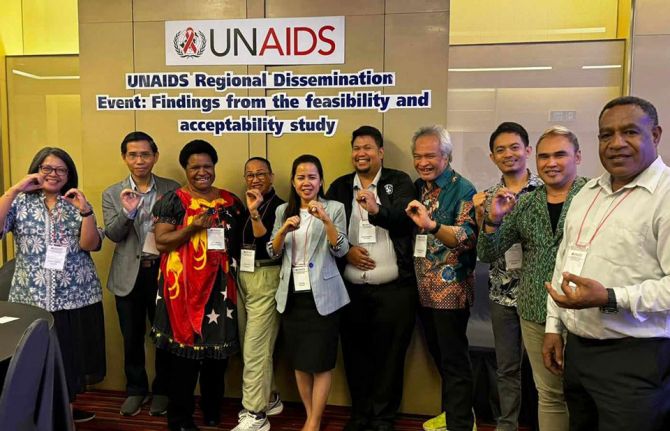
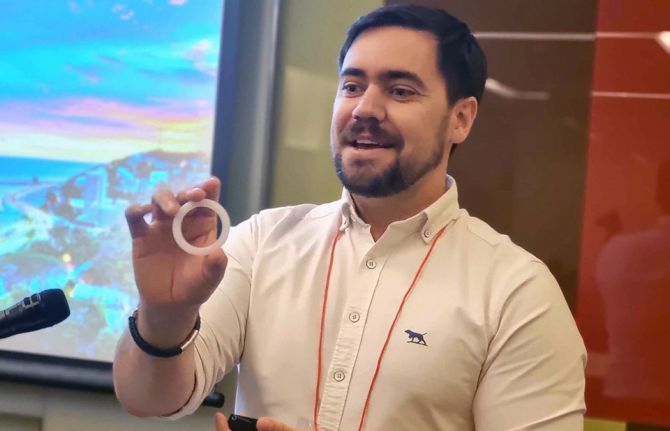
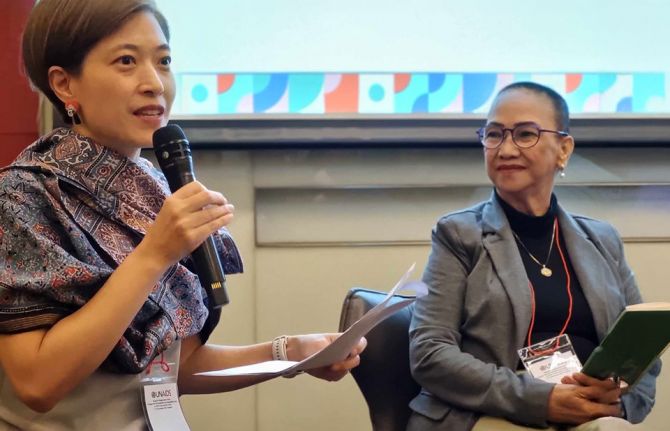
Feature Story
PrEP for her: Cambodia, Indonesia, Papua New Guinea and the Philippines prepare to introduce the Dapivirine ring to help prevent HIV
22 November 2024
22 November 2024 22 November 2024The only HIV prevention that Elena Felix knew of was condoms. But condoms were not something that she was able to make use of, and she contracted HIV. Thirty years after her diagnosis, she’s helped conduct research to determine whether women in the Philippines would use a more confidential tool, and one that does not need a man to agree, to lower women’s risk of HIV infection.
“We hear from women that some partners insist on not using condoms. We hear cases too of rape. Women need protection that does not depend on men” the Association of Positive Women Advocates founder explained.
The Dapivirine Vaginal Ring or DVR was given the green light by the World Health Organization for women at high risk of contracting HIV in 2021. Unlike other types of pre-exposure prophylaxis (PrEP), this one is exclusively for women. It is a silicone vaginal ring that is inserted and worn for 28 days before being replaced. It releases an antiretroviral drug locally, reducing the risk of HIV infection through vaginal sex by half.
Since its introduction, the technology was made available in several (11) African countries. And with good reason. Around two-thirds of new HIV infections in Eastern and southern Africa and Western and central Africa are among adolescent girls and women. The combination prevention strategies implemented in these two regions have super-charged progress, driving the global 39% decline in new infections since 2010.
But the Asia Pacific picture is quite different.
“This region has an HIV prevention crisis,” Eamonn Murphy, UNAIDS Regional Director for Asia Pacific and Eastern Europe Central Asia said. “And I am not speaking only of the countries where new infections have doubled, tripled or increased six times since 2010. The average regional decline in new infections is far too slow. At 13% it has virtually flatlined.”
He was speaking to a group of community, government, research and development partners from Cambodia, Indonesia, Papua New Guinea and the Philippines who met from November 11 – 12 in Bangkok. Findings were disseminated from a DVR acceptability and feasibility study conducted by ThinkPlace, and a discussion held on next steps. UNAIDS and the World Health Organization (WHO) are providing technical support for this initiative. The Australia Department of Foreign Affairs and Trade (DFAT) funded the research as part of its ongoing support for prevention work in the region.
Seven percent of new infections in Asia Pacific are among sex workers while 12 percent occur among the intimate partners of key populations. Angeli Achrekar, UNAIDS Deputy Executive Director, called for women in Asia and the Pacific to be provided more HIV prevention options.
“Choice is the way to go!” Ms Achrekar stressed. “Providing options in prevention tools and service delivery increases overall use and results. We must ensure that people have access and that they are supported with the appropriate policies and enabling environment. The ring has great potential to be empowering as an additional choice for women, including in Asia Pacific.”
A person newly acquires HIV in the Asia Pacific region every two minutes. Despite this, the overall momentum on rolling out pre-exposure prophylaxis (PrEP) options has been sluggish. At the end of 2023 there were just 204,000 PrEP users in this region, 98% short of the 8,200,000 target by 2025. The vast majority of those on PrEP were men.
ThinkPlace Regional Director, Elliot Duffy, revealed that overall, the studies found women have high interest in this discreet, woman-controlled prevention method. Sex workers in the four countries sought the DVR given their high vulnerability to sexual violence. And in all countries the sex workers indicated that they would want to access the DVR through community-based health services or their local healthcare facilities. The research also found that healthcare providers in the four countries were enthusiastic about offering this new prevention option.
“The number one barrier is the extent to which women understand how the ring would fit. Many had questions like, “would it be lost in my body? Will I feel pain? Will I be able to have sex?’ Some women worried about a partner thinking they distrusted them,” Mr Duffy explained. “The DVR is not immune to the challenges of other HIV programs and continued effort is needed to increase awareness, generate demand and create services that are accessible.”
Already the research findings have resulted in the introduction and phased implementation of the DVR into 2024 – 2026 Global Fund grant implementation for Cambodia and Indonesia. Cambodia has begun pilot testing. At the meeting the four country teams developed plans to guide their next steps, including on further research, legal and policy reviews, regulatory approvals and community system strengthening.
DFAT Health Adviser, Joshua Metcalf-Wallach, emphasized that as stakeholders switched gears from research to rollout, they should keep communities in the driver’s seat.
“Our Indo-Pacific prevention work has shown that HIV services work best when they are key population- and community-led. As we expand prevention options for women, let us be guided by their needs and demands,” he ended.
Our work
Related
 Status of HIV Programmes in Indonesia
Status of HIV Programmes in Indonesia

24 February 2025

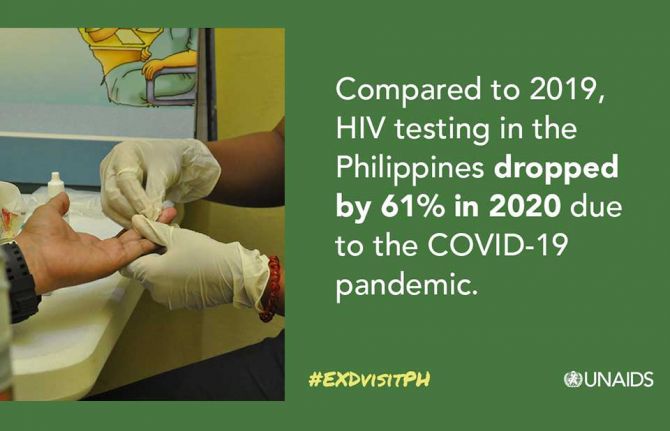
Feature Story
Community-led HIV services stepped up in the Philippines during the COVID-19 pandemic
11 May 2021
11 May 2021 11 May 2021The HIV response in the Philippines has been hit by the COVID-19 pandemic, especially access to HIV prevention and treatment services. According to the Global Fund to Fight AIDS, Tuberculosis and Malaria, in Metro Manila coverage of HIV prevention services for gay men and other men who have sex with men has decreased by 74% since 2019. Government figures show that compared to 2019, in 2020 HIV testing decreased by 61% and enrolment in HIV care reduced by 28%. The COVID-19 pandemic has drawn attention to socioeconomic divides, highlighting failures within the health system to adequately deal with not one pandemic but two.
Despite this, what has been clear from the onset of the COVID-19 outbreak is that civil society and communities have stepped up to the challenge to provide HIV services while navigating through restrictions on movement and lockdowns. One example is the Family Planning Organization of the Philippines (FPOP), a civil society health service provider and advocate of sexual and reproductive health and rights with a network of more than 1000 community-based services across the country. One of those service providers is the Rajah Community Center, a primary HIV clinic located in Iloilo City in the Western Visayas region of the Philippines, which provides HIV services for key populations, including young key populations, in a friendly and stigma-free environment.
“When I tested positive for HIV, I knew nothing about it. I did not know how to protect myself from it and talking about sex was taboo in my house. My friends and I were clueless about condoms,” said Jhenard Jude, a young person from Iloilo City. After receiving his positive diagnosis, Mr Jude learned about the Rajah Community Center. “I heard from my friends that Rajah provides youth-friendly services. I was worried about how others would look at me because of my status, but the staff at the clinic were non-judgemental and very friendly. I was given a care worker who supported me every step of the way to access antiretroviral therapy,” he said.
“This is home to me. I got my HIV self-test kit here in June 2020. Rajah is safe and convenient,” said Lloyd Legario, a young person who regularly visits the clinic for HIV testing and prevention services.
Winnie Byanyima, the UNAIDS Executive Director, has been learning about the Rajah Community Center during a two-day virtual mission to the Philippines to engage with communities, civil society and the government about the country’s response to HIV and COVID-19. During her virtual visit, Ms Byanyima was given a pre-recorded tour of the community clinic and had an open dialogue with Mona Liza S. Diones, the Chapter Program Manager of FPOP Iloilo, Robert Figuracion, the Rajah Community Center Clinic Officer, and three clinic clients from key populations.
“I had the pleasure to speak with some very courageous people who were very open about their experiences at the Rajah Community Center. I extend my deepest gratitude and solidarity to community-based organizations and frontline workers for stepping up and providing essential services during COVID-19,” said Ms Byanyima.
To ensure the continuity of HIV services during COVID-19, FPOP Iloilo worked closely with the Philippines Department of Health, local government units and other treatment hubs and support groups to serve key populations and people living with HIV. Blended services that included online counselling and onsite services covered prevention commodities, testing services, treatment and medical care. This also included providing psychosocial services, which have seen a sharp rise in demand since the first COVID-19 outbreak. Telemedicine and mobile clinics became new channels for differentiated care. Innovative programmes to deliver antiretroviral therapy to clients were established and pre-exposure prophylaxis (PrEP) and condoms were frontloaded to community champions for distribution.
During the virtual visit, Ms Byanyama also learned about the HIV & AIDS Support House (HASH), another renowned community-led service provider, which in coordination with the Department of Health has worked to prevent disruption to HIV services during COVID-19. HASH offers community-based screening, PrEP, HIV referral services, medical assistance to children living with HIV and psychosocial support to key populations. “Civil society organizations were quick to respond to the situation by coming out with innovative courses of action, such as online counselling, alternative modes of antiretroviral therapy delivery and mobilization of volunteers and partners to assist those who were affected by the COVID-19 pandemic,” said Desi Drew Ching, the President of HASH.
“To sustain community-led services, government and development partners have to optimize collaborative partnerships with civil society. This will strengthen their leadership capacities and enhance civic space funding through social contracting programmes,” said Louie Ocampo, the UNAIDS Country Director for the Philippines.
Related

COVID-Blog
Pasig City signs Fast-Track Cities Initiative to scale-up the response to the HIV epidemic in the context of COVID-19
22 July 2020
22 July 2020 22 July 2020In the Philippines, the Mayor of Pasig City, Vico Sotto signed a declaration of commitment to implement the Fast-Track Cities Initiative (FTCI), which aims to scale-up the response to the growing HIV epidemic in the context of the COVID-19 pandemic.
Pasig City will proactively deliver quality services to everyone, including hard-to-reach populations, by increasing investments to scale-up HIV programs, establishing more treatment facilities and integrated social hygiene clinics, and training more healthcare providers to deliver HIV and COVID-19 services.
UNAIDS will provide technical support in the implementation of the strategy to ensure that efforts at the local level are strengthened to respond to COVID-19 and HIV, including scale up of testing and zero discrimination programmes for healthcare providers.
Learning from the HIV response, Pasig City is one of the cities that is providing COVID-19 testing to its residents, has introduced a loan program to revitalize the economy of small and medium enterprises, and established quarantine facilities providing food and medical care and other essential needs.
Region/country
Related
 Status of HIV Programmes in Indonesia
Status of HIV Programmes in Indonesia

24 February 2025

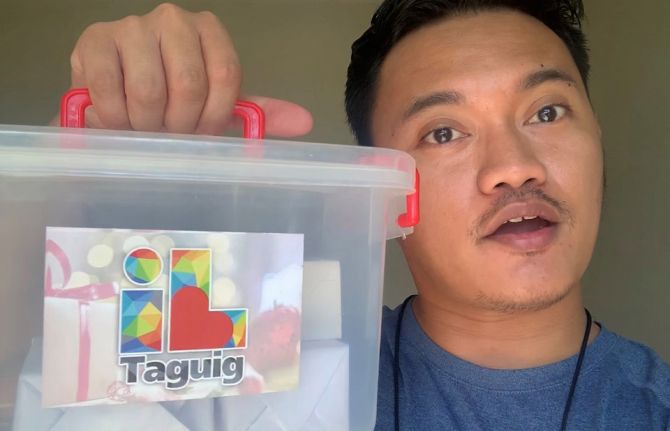

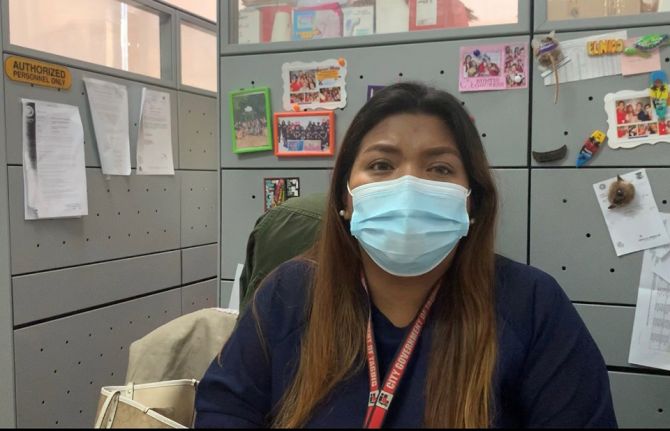
Feature Story
Ensuring that people living with HIV in the Philippines have access to treatment during COVID-19
08 April 2020
08 April 2020 08 April 2020The COVID-19 pandemic and the lockdown imposed by the Government of the Philippines to curb the spread of the disease are impacting the lives of people living with HIV across the country, creating a serious challenge to accessing life-saving antiretroviral therapy. To help address those challenges, civil society organizations have come together to support people living with HIV to access treatment.
Through a coordinated community-led mechanism, Network Plus Philippines, Pinoy Plus Advocacy Pilipinas, the Red Whistle and TLF Share Collective, are working together in the implementation of a new guideline issued by the Department of Health. The new guideline directs local authorities to ensure that people living with HIV can collect their medicine at the nearest HIV clinic and encourages the use of courier services for the pick-up and home delivery of antiretroviral therapy in order to avoid the risk of increased exposure to COVID-19.
“For many people living with HIV, accessing antiretroviral therapy from the nearest treatment hub is a welcome development. However, the nearest facility may not be within walking distance, and public transportation has been restricted. To be able to reach the HIV clinic, some need to pass through checkpoints, where they fear disclosure of their HIV status, as a few have already reportedly experienced,” said Richard Bragado, Adviser of Pinoy Plus Advocacy Pilipinas, an organization of people living with HIV, and the Administrator of Network Plus Philippines, the national network of organizations of people living with HIV.
The Red Whistle, a platform that raises awareness about HIV, has mobilized a pool of 40 volunteers to collect antiretroviral therapy refills from treatment hubs and deliver them to people across the country. TLF Share Collective, a civil society organization working on the sexual health, human rights and empowerment of lesbian, gay, bisexual, transgender and intersex (LGBTI) people, tapped the volunteers of its partner community-based organizations to deliver antiretroviral therapy.
“People living with HIV are displaced by the pandemic. Some lost their source of income and had to return to their original residence after losing their jobs. Ensuring uninterrupted treatment is not to be compromised. This is an integral part of our work on human rights,” said Anastacio Marasigan, Executive Director of TLF Share Collective.
Home delivery is made possible through a joint effort of civil society organizations and health facilities. “We ask treatment hubs to issue a letter of authorization to show to the checkpoint authorities that the driver is delivering essential medications. We are also working with local authorities to avoid unintended disclosures of confidential information of our clients at the checkpoints,” said Benedict Bernabe, Executive Director of the Red Whistle.
To identify the nearest treatment hubs, lists of antiretroviral therapy clinics have been disseminated through different channels, with the Red Whistle partnering with MapBeks, an online LGBTI mapping community, to create the Oplan #ARVayanihan, a map that includes all treatment hubs and primary HIV care facilities.
People living with HIV can share and ask for information through different platforms. Among them is the PLHIV Response Center, established by Pinoy Plus Advocacy Pilipinas to link callers with services. The hotline disseminates information about treatment hubs available and gives advice on how to access antiretroviral therapy.
TLF Share Collective has developed a tool to monitor the delivery of antiretroviral therapy by the community volunteers. The organization also developed frequently asked questions cards and consolidated existing hotline numbers.
“UNAIDS has regularly coordinated with civil society organization since the beginning of the COVID-19 outbreak, providing technical guidance and ensuring synergy with the efforts of the government,” said Louie Ocampo, UNAIDS Country Director for the Philippines.
The United Nations Development Programme and UNAIDS have developed a rapid survey to assess the different issues affecting people living with HIV in the Philippines. In addition to access-related issues, the results of the survey show the urgent need to protect human rights and facilitate access to mental health and social protection services. The findings have been shared with the government in order to ensure that actions are based on the constantly evolving situation in the context of the COVID-19 pandemic.
Our work
Region/country
Related

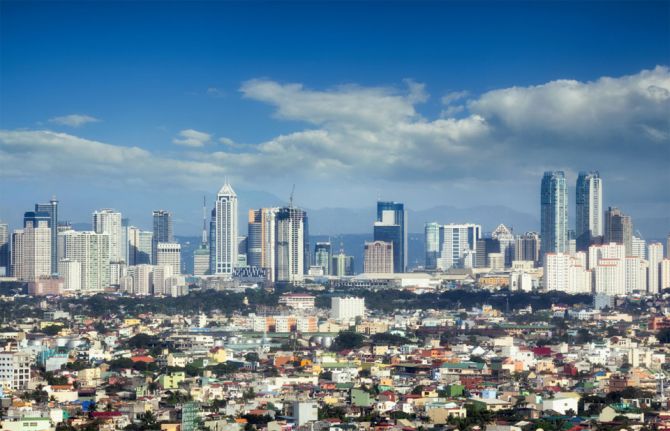
Feature Story
Cities in Philippines pledge to lower HIV infections and improve their track record
14 August 2018
14 August 2018 14 August 2018The League of Cities of the Philippines (LCP) pledged to fast-track the AIDS response in the cities, by signing a partnership agreement with UNAIDS to reduce the number of new HIV infections in the country. The signing event took place on the fringe of the LCP’s 30th anniversary celebrations on 27 July 2018. More than 145 mayors and local representatives from cities attended the event, which included a gala dinner.
UNAIDS’ newly released report, Miles to go: closing gaps, breaking barriers, righting injustices, shows that the annual new infections have more than doubled in the Philippines in the past seven years to an estimated 12,000 in 2017. With a 174% increase since 2010, the Philippines is the country with the fastest growing HIV epidemic in the Asia and the Pacific region. New infections have now overtaken Thailand, Viet Nam and Myanmar, placing Philippines number 5 in terms of new infections in 2018 in the region. Cities and urban areas are particularly affected. Health authorities say that 70 cities, including the 17 cities in metro Manila, accounted for 80% of reported HIV cases in the country.
“The AIDS epidemic in the country is an issue that needs urgent action among local governments, especially since key populations at risk of infections reside mostly in the cities,” said Laarni L. Cayetano, National Chair of the League of Cities of the Philippines.
Most agreed that there is a need to scale-up services tailored to key populations that go beyond female sex workers. More than 90% of new HIV infections are occurring among men who have sex with men (MSM) and transgender people (TG). Condom use among men who have sex with men and transgender people hovers at 50% and 37% respectively and HIV testing is low. Only 16% of MSM knew their HIV status in 2015.
Local governments in the Philippines have earmarked resources and started more innovative HIV prevention services. For example, Quezon City has opened three Sundown clinics (Klinikas) that provide rapid HIV testing and counseling in a non-stigmatizing environment for gay men, men who have sex with men and transgender people. The city has also increased its HIV funding nine times since 2012 and has been urging other provinces to follow suit.
“Philippines has a small window of opportunity to act fast and stop a major HIV epidemic from taking hold,” said Eamonn Murphy, UNAIDS Regional Director for the Asia and the Pacific. He added, “This commitment is achievable if cities where the epidemic is having a big impact take the lead.” He also reaffirmed UNAIDS commitment to work in close partnerships with national and local authorities to support their efforts to bring HIV infections under control and provide technical expertise in how best to invest funds and reach people.
For the National President of the League of Cities of the Philippines, Edgardo D. Pamintuan, time is of the essence. “I strongly believe that if we effectively implement HIV response strategies in our localities though our partnership with UNAIDS, our efforts at the city level can make a significant impact in reaching the country’s targets,” he said.
Fast-Track cities
Region/country
Related
 Status of HIV Programmes in Indonesia
Status of HIV Programmes in Indonesia

24 February 2025

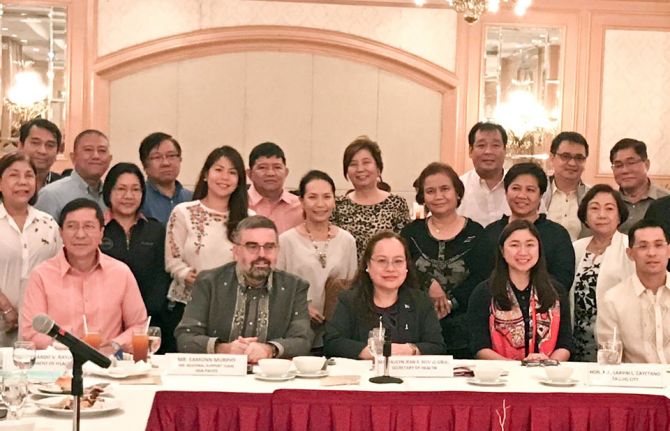
Update
Metro Manila city leaders commit to intensifying HIV response
11 September 2017
11 September 2017 11 September 2017Mayors and other city leaders from the 17 cities that make up the National Capital Region in the Philippines pledged to make the HIV epidemic a public health emergency requiring multisectoral strategies and a full provision of resources. The city representatives recently signed a city HIV resolution during a dinner meeting in Manila hosted by the Secretary of the Department of Health, Paulyn Jean Rosell-Ubial.
A recent UNAIDS report, Ending AIDS: progress towards the 90–90–90 targets, has helped to galvanize this action. The report found that the number of new HIV infections in the Philippines has risen by 140% in the past six years and the country has the fastest growing HIV epidemic in the Asia and the Pacific region. Health authorities say that the 17 cities in the National Capital Region accounted for more than 40% of reported HIV cases in the country.
Ms Rosell-Ubial stated that she had raised this alarm as early as last year, when she took office, calling the situation a national emergency. She appealed to the mayors and city officials of Metro Manila for their help in delivering crucial services to community groups and key populations. The Mayor of Taquig City and Chair of the League of Cities, Laarni “Lani” Cayetano, expressed her support for the initiative and underlined the efforts of Taguig City in providing HIV services.
The Secretary of Health expressed appreciation for the personal support of Eamonn Murphy, UNAIDS Director of the Regional Support Team for Asia and the Pacific, and for the long-term contribution from the UNAIDS country office.
Mr Murphy praised the strong leadership of the Secretary of Health and the commitment by cities in the Manila region and pledged to help mobilize technical support, and is in discussion with development partners regarding these efforts.
The city HIV resolution recognized that the 2030 Agenda for Sustainable Development committed countries to ensuring healthy lives and the well-being of all citizens, as well as ending AIDS by 2030. It commits cities to increasing financial investments and accelerating the implementation of high-impact programmes, including ensuring quick diagnosis and entry into treatment, HIV services tailored to the needs of gay men and other men who have sex with men and innovative prevention programmes, including targeted outreach and pre-exposure prophylaxis. The resolution also promised to eliminate HIV-related stigma and discrimination and other human rights violations that prevent key populations and people living with HIV from accessing services.
Quotes
“We can buy all the drugs that we need. We can buy all the test kits that we need. We can find the government funding to do this, but what we need is for our cities to join with the Department of Health in making sure that we deliver through new and innovative delivery systems. Without this partnership, we won't reach our goals of 90–90–90 and 100% elimination of mother-to-child transmission by 2020.”
“I am confident that all cities in the National Capital Region will heed the call to take the actions necessary to reach our 90–90–90 goals by 2020. As the Chair of the Philippines League of Cities, I call on all cities in the country to join us and act now.”
“The Philippines responded quickly and innovatively in partnership with the community to the first wave of the epidemic, and through strong, pragmatic and committed leadership is showing the nation has the capacity and the resolve to meet the challenges presented by the new wave of growing infections, particularly among young gay men and other men who have sex with men and transgender people.”
Region/country
Related
 Status of HIV Programmes in Indonesia
Status of HIV Programmes in Indonesia

24 February 2025

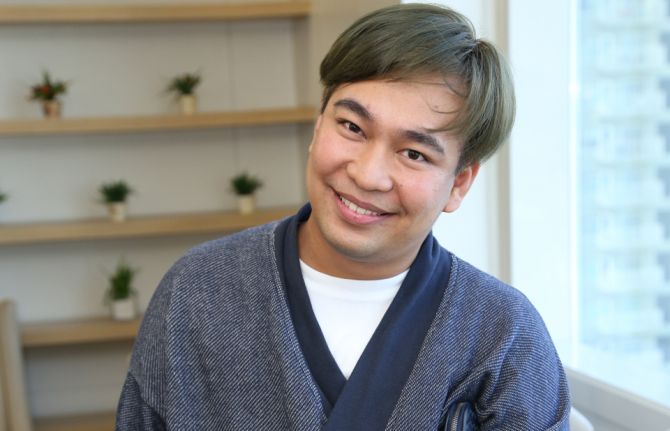
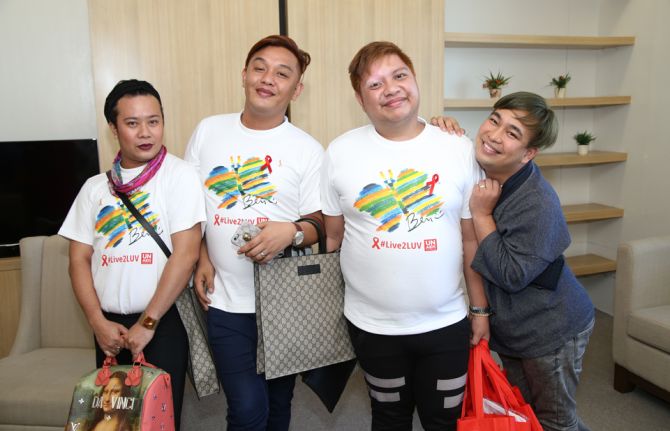
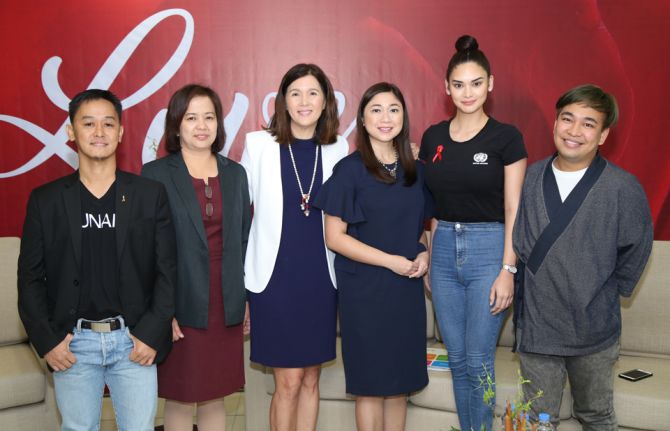
Update
Grassroots hero: thinking out of the box by mixing health and fun
15 August 2017
15 August 2017 15 August 2017There is a quiet hum in the room from the mostly young men sitting in chairs, eyeing their smartphones and chatting. Suddenly, a cheerful figure bursts into the executive lounge of the high-rise building in Taguig City, Philippines.
“Thank you, thank you,” said Ronivin (Vinn) Garcia Pagtakhan, the Executive Director and Founder of LoveYourself, a community-based organization providing health and empowerment services to men who have sex with men and transgender people. The team were wrapping up after a major event promoting HIV testing.
Mr Pagtakhan, with his shock of brown hair, frosted with a light green tint, bounced from one group to the next, joking and repeating his thanks.
Almost everyone here is a volunteer,” explained Mr Pagtakhan. “I get really moved when I talk about my volunteers. I owe everything to them.”
LoveYourself provides HIV testing and treatment services, as well as oral pre-exposure prophylaxis (PrEP) and tuberculosis screening. It has 25 staff members, who are supported by around 800 volunteers. Mr Pagtakhan founded LoveYourself in 2011, modelling it on a lesbian, gay, bisexual and transgender youth centre he volunteered in while living in San Francisco, United States of America.
“At the time, I felt there was a real problem with the way we were handling HIV prevention among the gay community in the Philippines,” said Mr Pagtakhan. “It was all about fear. I wanted something more optimistic and encouraging. I wanted a place that was lively, where people would want to hang out.”
He was only 25 years old at the time. “As they say, I know my market, because I am part of the community.”
He graduated from nursing school in the Philippines when he was 18 and got the fourth highest score on the national nursing board examinations. “This meant that I was in high demand by other candidates as a teacher helping to prepare people for their licensing exams. I travelled around the Philippines giving classes and I used social media to reach out to students as well,” said Mr Pagtakhan.
He became a celebrity on social media, with 600 000 followers on Twitter, and won the prestigious international Twitter Shorty Awards as the Nurse of the Year. The prize money helped start LoveYourself.
“The first three years, it was like sending your child off to college. I basically supported the organization on my earnings. We didn’t have any donors,” said Mr Pagtakhan. “I like to think out of the box and I had a particular vision. I didn’t want grants to dictate what we did or became. I wanted to create ripples of positive change in the community. LoveYourself isn’t just about HIV, but rather about increasing a person’s self-worth.
The organization has three community centres in the Manila, Philippines, area offering HIV testing and other services. Anyone can drop in, even on the weekends and in the evenings, for free health services.
LoveYourself tested about 20 000 people in 2016 and diagnosed around 1500 new HIV infcetions, which represent around 50% of the newly diagnosed HIV cases reported by the Department of Health in Manila. LoveYourself also works with companies and schools to help them develop HIV policies and to conduct on-site HIV tests.
In July, the organization began piloting PrEP and with support from UNAIDS and the World Health Organization plans to start a demonstration project offering self-testing before the end of the year.
In just six years, LoveYourself has grown to become an important HIV service provider in Manila. Mr Pagtakhan is proud of the organization’s achievements and has bigger ambitions. “We are still renting. I want LoveYourself to own a place, which is a community centre, where we can have health services but also original events and activities,” he said.
For more information on LoveYourself, go to http://www.loveyourself.ph.
Resoures
Region/country
Related
 U=U can help end HIV stigma and discrimination. Here’s how
U=U can help end HIV stigma and discrimination. Here’s how

27 February 2025
 Status of HIV Programmes in Indonesia
Status of HIV Programmes in Indonesia

24 February 2025

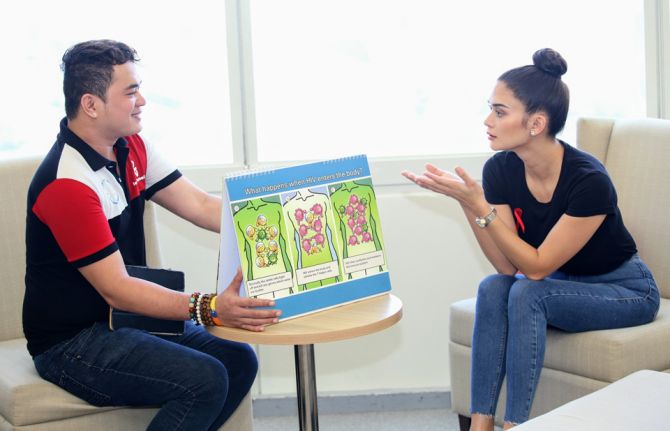
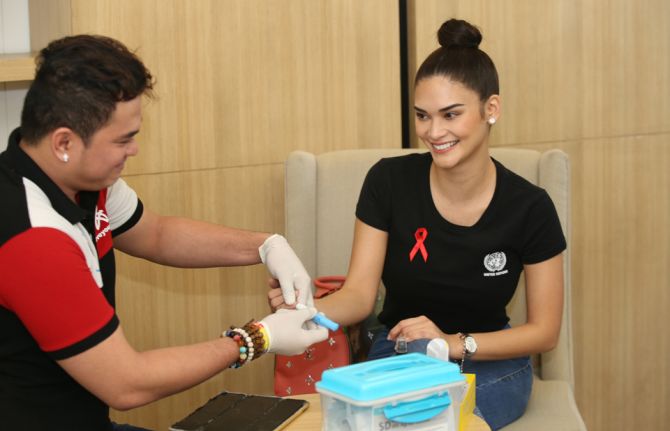
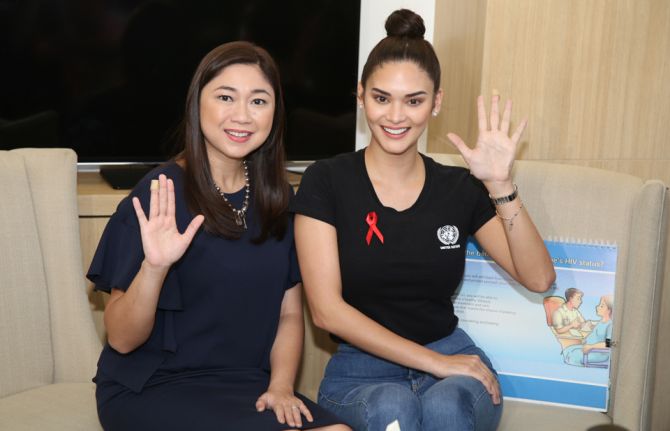
Feature Story
UNAIDS Goodwill Ambassador Pia Alonzo Wurtzbach ramps up HIV advocacy efforts
09 August 2017
09 August 2017 09 August 2017Miss Universe 2015 and UNAIDS Goodwill Ambassador for Asia and the Pacific, Pia Alonzo Wurtzbach has launched an HIV awareness campaign with a public HIV screening. On 9 August, the model and actress, along with Mayor Lani Cayetano of Taguig City in the Philippines undertook the screening which was conducted by the community organization LoveYourself in Taguig City.
“As the UNAIDS Goodwill Ambassador for Asia and the Pacific, I wanted to start my HIV advocacy here at home in the Philippines,” said Ms Wurtzbach. “It’s important because the country has the fastest growing HIV epidemic in the region.”
A recent UNAIDS report has found that new HIV infections in the Philippines increased 140% between 2010 and 2016. Taguig City is one of the 17 cities in the Metro Manila area, which account for 40% of new infections in the country. Mayor Cayetano is the national chairperson of the League of Cities in the Philippines and promised to encourage other cities to scale-up HIV testing.
“The city of Taguig will always be here to support you Pia,” said Mayor Cayetano.
Ms Wurtzbach unveiled the project Progressive Information Awareness campaign, or the PIA project which aims to inform young people about HIV through social media, youth-friendly and informative videos, as well as promote policies which will enable young people, particularly from key populations to access HIV and other key health services. The PIA project is also working with a coalition of government, non-profit organizations and business partners on a major fundraising and award World AIDS Day Gala.
“With the PIA Project we hope to see an increase in HIV awareness, spread love for people living with HIV, and make HIV testing among Filipinos a normal part of their health and wellness routine,” said Ms Wurtzbach.
Across Asia and the Pacific young people from key populations are at higher risk of HIV.
“The HIV movement among young people that Pia is lighting up here in the Philippines will resonate around the Asia-Pacific region,” said Eamonn Murphy, Director, UNAIDS Regional Support Team for Asia-Pacific.
Region/country
Related
 Status of HIV Programmes in Indonesia
Status of HIV Programmes in Indonesia

24 February 2025

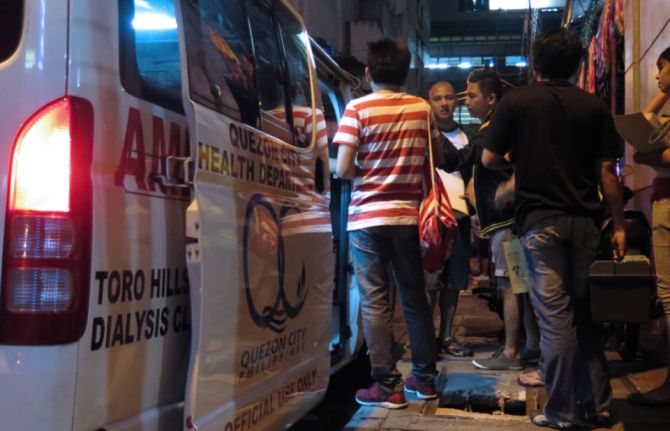
Feature Story
Quezon City’s HIV programme becomes a model for other cities
13 July 2017
13 July 2017 13 July 2017The 2030 Agenda for Sustainable Development takes to scale what the AIDS response has been working towards for 30 years—a multisectoral, rights-based, people-centred approach that addresses the determinants of health and well-being. The individual stories in this series highlight the linkages between HIV and related Sustainable Development Goals (SDGs), each told from the personal perspective of people affected by HIV. The series paints a picture of how interconnected HIV is with the SDGs and how interdependent the SDGs are with each other. Most importantly, the stories show us the progress we have achieved with the AIDS response and how far we have left to go with the SDGs.
Klinika Bernardo, popularly known as the Sundown Clinic, is located along a bustling highway. It operates from 15:00 until 23:00, allowing a maximum number of clients to visit. “We cater to men who have sex with men from all over the Philippines,” said Leonel John Ruiz, head physician at Klinika Bernardo. “Only 40% of our clients are from Quezon City.”
In 2012, Quezon City became the first city in the Philippines to open a clinic providing services for men who have sex with men and transgender people. From the start, demand for services at the Sundown Clinic was high. Almost 250 HIV tests and pre- and post-test counselling services were carried out in its first two months of operation, and 18 people tested positive for HIV.
Although same-sex relationships are legal in the Philippines, there is a high degree of stigma and discrimination towards men who have sex with men. Fear of being outed and ostracized prevents many men from accessing traditional health services. Studies by city health officials show that two-thirds of men who have sex with men in Quezon City have never had an HIV test.
“This is my first HIV test. I do not know what to expect,” said one young man while filling out registration forms. “I tried to read up on HIV so I would have some background information, but it took me a while to gather the courage to come here.” The young man found the staff supportive and skilled at calming his nerves. People who test positive for HIV receive counselling on antiretroviral medicines and are accompanied by staff through their initial months of HIV treatment, which is free in the Philippines.
Quezon City now operates three Sundown Clinics and in the past few years has significantly increased investments in its HIV programmes. With nearly 3 million residents, Quezon City is the Philippines’ most populous urban centre and has made stopping a burgeoning AIDS epidemic a top priority. Mayor Herbert Bautista has encouraged city residents to know their HIV status, and he has taken an HIV test in public. The city’s effort to scale up HIV testing among men who have sex with men has proven successful, with such tests increasing 30 times. Forty per cent of the city’s HIV tests take place in Sundown Clinics, effectively proving that removing barriers increases access to services.
“Since we have been operating, the perspective has definitely changed,” says Leonel. “Before, we would have a hard time inviting people for testing. Now, most of our clients are walk-ins. People are personally and actively seeking information.” Several other local city governments are starting to adapt the Quezon City model and establish their own clinics.
The Sundown Clinic staff speak proudly of their achievements, but they look forward to closing shop one day. “I pray before sleeping,” says Adel, the only female peer educator at Klinika Bernardo. “I hope that one day there will be no one in need of our services. That’s what I am working for.”
SDG 17: Strengthen the means of implementation and revitalize the global partnership for sustainable development
Early in the AIDS response, in the absence of treatment options and the overwhelming scale of people affected by HIV, it was clear that a purely clinical response to the epidemic was not sufficient. Relatives, faith-based organizations and alliances of people affected by HIV stepped in to do what they could to help people die with dignity, to support the orphans, spouses and dependants left behind and to fight for a new way of doing things. Groups of vastly different people linked by the shared experience of the fear and stigma and horror of HIV and AIDS came together to demand that the response go beyond clinics, hospitals and the formal health service.
Embracing and expanding the concept of partnership was revolutionary, not for AIDS but also in the broader development sphere. Partnerships continue to be central to the AIDS response. Coordination and collaboration across a wide range of partners, including sex workers, scientists and social workers, helps to identify and use expertise more effectively, overcome barriers more quickly and allocate resources more efficiently. Partnerships increase awareness and knowledge and create a critical mass of power and support that help to influence policy-makers and spur stakeholders to take action.
The story of the Sundown Clinic in Quezon City in the Philippines embodies SDG 17—strengthen the means of implementation and revitalize the global partnership for sustainable development. The success of the original clinic and the subsequent addition of two more clinics demonstrate how inclusivity continues to define the AIDS response and provide the inspiration for successful partnerships between a wide diversity of stakeholders.
Learn more about SDG Goal 17
Region/country
Related
 Status of HIV Programmes in Indonesia
Status of HIV Programmes in Indonesia

24 February 2025

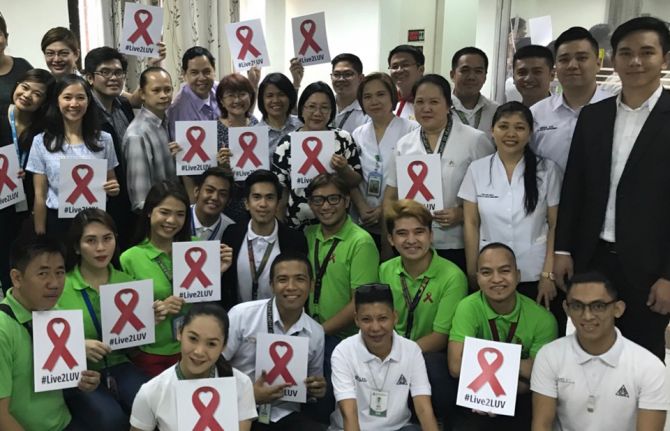
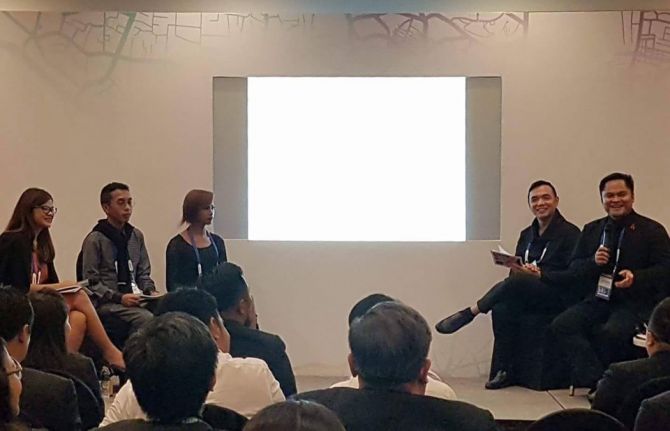
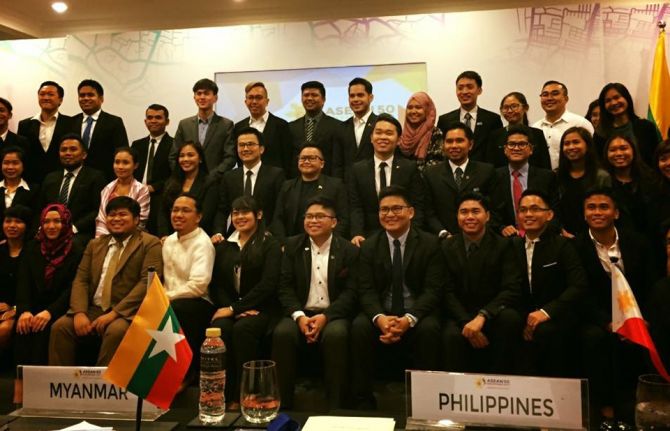
Update
Campaign to raise HIV awareness among young people in ASEAN region launched
28 April 2017
28 April 2017 28 April 2017A new campaign called #Live2LUV aims to promote information on sexual and reproductive health, including HIV, among young people in South-East Asian countries. UNAIDS, along with regional networks of young people, Youth Lead and Youth Voices Count, and the United Nations Children’s Fund and the United Nations Population Fund, launched the campaign during the four-day Association of Southeast Asian Nations (ASEAN) Youth Summit in Manila, Philippines, which ends on 29 April.
“The #Live2LUV campaign will help to inspire, promote and educate young people on sexual and reproductive health and rights and HIV, as well as reduce stigma towards young key populations in the Association of Southeast Asian Nations region,” said Junelyn Tabelin of Youth LEAD.
In the Asia and Pacific region, young people (15–24 years old) account for 37% of new HIV infections. Data show that young people from key populations are at even higher risk of HIV infection than their older counterparts. For example, in Thailand, among young gay men and other men who have sex with men HIV prevalence is 11%, compared with 8.3% among gay men and other men who have sex with men who are 25 years and older.
According to behavioural studies in eight countries, comprehensive knowledge of HIV is low in many South-East Asian countries.
“I didn’t have the right information on HIV and I didn’t know how to protect myself,” said Relly Manlapaz, a 17-year-old transgender woman, who participated in a UNAIDS session at the youth summit. “Before joining the HIV advocacy work, I used to believe that one could get HIV through mosquito bites and by sharing utensils with someone living with HIV,” she added.
The #Live2LUV campaign will use social media to disseminate information on HIV prevention and treatment, and will encourage an enabling environment for young key populations with messages encouraging understanding, acceptance and zero discrimination.
The regional partners will work with local organizations in each of the 10 ASEAN countries to clear up misunderstanding about HIV and provide information in a youth-friendly manner. The campaign will cover different key HIV themes, as well as create a forum for young people to share their stories. A platform has been developed to host all the campaign materials and resources at www.hivandyouth.org. The eight-month-long social media campaign will culminate on World AIDS Day and will garner support from celebrities and influencers on social media.
UNAIDS is working with countries to ensure that, by 2020, 90% of young people have the skills, knowledge and capacity to protect themselves from HIV and have access to sexual and reproductive health services.
Resources
Region/country
Related
 Status of HIV Programmes in Indonesia
Status of HIV Programmes in Indonesia

24 February 2025



